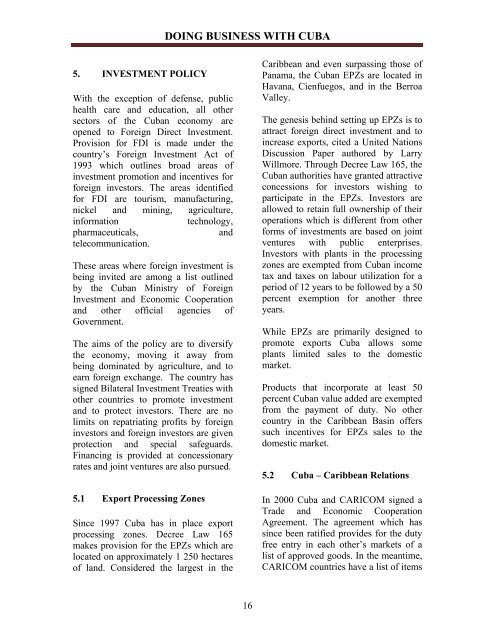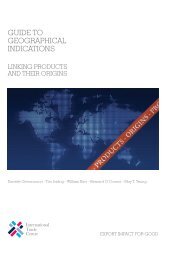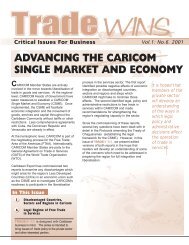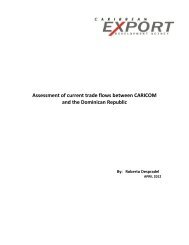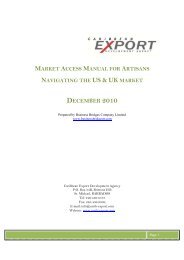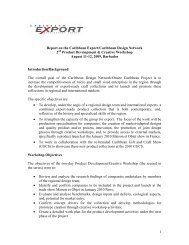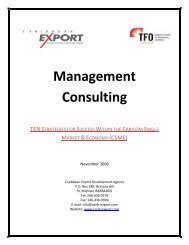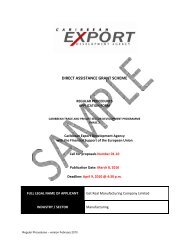doing business with cuba - Caribbean Export Development Agency
doing business with cuba - Caribbean Export Development Agency
doing business with cuba - Caribbean Export Development Agency
You also want an ePaper? Increase the reach of your titles
YUMPU automatically turns print PDFs into web optimized ePapers that Google loves.
5. INVESTMENT POLICY<br />
With the exception of defense, public<br />
health care and education, all other<br />
sectors of the Cuban economy are<br />
opened to Foreign Direct Investment.<br />
Provision for FDI is made under the<br />
country’s Foreign Investment Act of<br />
1993 which outlines broad areas of<br />
investment promotion and incentives for<br />
foreign investors. The areas identified<br />
for FDI are tourism, manufacturing,<br />
nickel and mining, agriculture,<br />
information technology,<br />
pharmaceuticals, and<br />
telecommunication.<br />
These areas where foreign investment is<br />
being invited are among a list outlined<br />
by the Cuban Ministry of Foreign<br />
Investment and Economic Cooperation<br />
and other official agencies of<br />
Government.<br />
The aims of the policy are to diversify<br />
the economy, moving it away from<br />
being dominated by agriculture, and to<br />
earn foreign exchange. The country has<br />
signed Bilateral Investment Treaties <strong>with</strong><br />
other countries to promote investment<br />
and to protect investors. There are no<br />
limits on repatriating profits by foreign<br />
investors and foreign investors are given<br />
protection and special safeguards.<br />
Financing is provided at concessionary<br />
rates and joint ventures are also pursued.<br />
5.1 <strong>Export</strong> Processing Zones<br />
Since 1997 Cuba has in place export<br />
processing zones. Decree Law 165<br />
makes provision for the EPZs which are<br />
located on approximately 1 250 hectares<br />
of land. Considered the largest in the<br />
DOING BUSINESS WITH CUBA<br />
16<br />
<strong>Caribbean</strong> and even surpassing those of<br />
Panama, the Cuban EPZs are located in<br />
Havana, Cienfuegos, and in the Berroa<br />
Valley.<br />
The genesis behind setting up EPZs is to<br />
attract foreign direct investment and to<br />
increase exports, cited a United Nations<br />
Discussion Paper authored by Larry<br />
Willmore. Through Decree Law 165, the<br />
Cuban authorities have granted attractive<br />
concessions for investors wishing to<br />
participate in the EPZs. Investors are<br />
allowed to retain full ownership of their<br />
operations which is different from other<br />
forms of investments are based on joint<br />
ventures <strong>with</strong> public enterprises.<br />
Investors <strong>with</strong> plants in the processing<br />
zones are exempted from Cuban income<br />
tax and taxes on labour utilization for a<br />
period of 12 years to be followed by a 50<br />
percent exemption for another three<br />
years.<br />
While EPZs are primarily designed to<br />
promote exports Cuba allows some<br />
plants limited sales to the domestic<br />
market.<br />
Products that incorporate at least 50<br />
percent Cuban value added are exempted<br />
from the payment of duty. No other<br />
country in the <strong>Caribbean</strong> Basin offers<br />
such incentives for EPZs sales to the<br />
domestic market.<br />
5.2 Cuba – <strong>Caribbean</strong> Relations<br />
In 2000 Cuba and CARICOM signed a<br />
Trade and Economic Cooperation<br />
Agreement. The agreement which has<br />
since been ratified provides for the duty<br />
free entry in each other’s markets of a<br />
list of approved goods. In the meantime,<br />
CARICOM countries have a list of items


